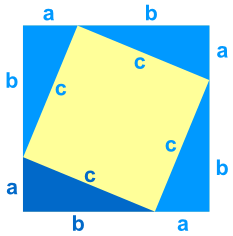The Pythagorean Theorem says that, in a right triangle, the
a^2 + b^2 = c^2
Proof:
We can show that a^2 + b^2 = c^2 using Algebra
Take a look at this diagram:

it has that "abc" triangle in it (four of them actually):
It is a big square, with each side having a length of a+b, so the total area is:
A = (a+b)(a+b)
Now let's add up the areas of all the smaller pieces:
First, the smaller (tilted) square has an area of: c^2
Each of the four triangles has an area of: ab/2
So all four of them together is: 4ab/2 = 2ab
Adding up the tilted square and the 4 triangles gives: A = c^2 + 2ab
The area of the large square is equal to the area of the tilted square and the 4 triangles. This can be written as:
(a+b)(a+b) = c^2 + 2ab
NOW, let us rearrange this to see if we can get the Pythagoras theorem:
Start with: (a+b)(a+b) = c2 + 2ab
Expand (a+b)(a+b): a^2 + 2ab + b^2 = c^2 + 2ab
Subtract "2ab" from both sides:
a^2 + b^2 = c^2 DONE!